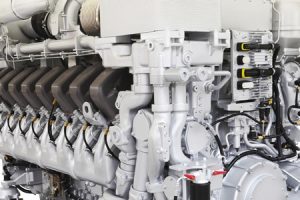[breadcrumb]
 How Can a Diesel Technician Get Mesothelioma by Occupational Exposure to Asbestos?
How Can a Diesel Technician Get Mesothelioma by Occupational Exposure to Asbestos?
Diesel technicians inspect and repair trucks, buses and vehicles with a diesel engine. Diesel engines are standard in powering trucks and buses, and are also included in bulldozers, cranes and other commercial vehicles.
One major source of asbestos exposure for diesel technicians is brake assemblies. While passenger vehicles only contain one brake shoe and brake lining for each brake drum, trucks and tractor trailers usually contain two brake shoes and four brake linings per drum. These materials often contained asbestos, so diesel technicians who regularly replaced brakes as part of their job duties may have been exposed to airborne asbestos dust that they released while conducting this work. The process to replace brakes often resulted in sanding, grinding brake parts and other activities that caused asbestos dust to fill the air. Often, diesel technicians and other mechanics worked in confined spaces where asbestos fibers may stay in the air where they can be breathed in by the mechanics and others in the shop.
Additionally, tires often contained asbestos, so technicians who regularly repaired or replaced tires could have been exposed to asbestos.
Common job duties of diesel technicians include:
- Inspect vehicles to determine cause of mechanical issues
- Inspect brake systems, transmissions, engines, steering mechanisms and other vehicle parts
- Maintain vehicles with a diesel engine
- Follow checklists to maintain and inspect vehicles
- Repair or replace malfunctioning components
- Make major and minor engine repairs
- Rotate tires and perform other basic care and maintenance
- Conduct work on a vehicle’s electrical and exhaust systems to comply with environmental regulations
- Use handheld and power tools
Locations in the United States for the Highest Employment Rates for Diesel Technicians
According to the U.S. Bureau of Labor Statistics, there are currently 285,300 people employed as a diesel service technician or mechanic. States with the highest employment rates for diesel technicians include:
- Texas
- California
- Pennsylvania
- Florida
- New York
Similar Occupations as Diesel Technicians
Similar occupations as diesel technicians include:
- Aircraft and avionics equipment mechanics and technicians
- Automotive body and glass repairers
- Automotive service technicians and mechanics
- Heavy vehicle and mobile equipment service technicians
- Small engine mechanics
Lawsuits and Settlements Involving Diesel Technicians and Mesothelioma
While there have been many cases involving general mechanics and asbestos exposure, there are fewer reported cases involving diesel technicians or mechanics of heavy equipment. However, there are some cases of this nature. For example, a New York jury returned a verdict of $12.5 million dollars to a mechanic who performed repairs on the drivetrains of forklifts of for Caterpillar, Inc from 1969 to 1978. He worked on valves, clutches, brakes, gaskets and engines that contained asbestos. This work led to him developing lung cancer.
Studies Related to Diesel Technicians and Asbestos
A number of studies have connected truck drivers, mechanics and automotive parts to asbestos exposure. In the 2007 study entitled “Cumulative asbestos exposure for US automobile mechanics involved in brake repair (circa 1950s–2000)” published in the Journal of Exposure Science & Environmental Epidemiology found that brake mechanics who worked in the 1950s to 1970s without installation of dust-control technologies had cumulative exposures ranging from 0.16 to 2.79 f/cm3 years while those who worked in garages with dust-control measures had substantially lower exposure.
In a study entitled “Case-Control Study of Lung Cancer and Truck Driving in the Teamsters Union,” researchers found that diesel truck drivers had a higher incident of developing lung cancer, compared to workers outside the trucking industry.
The 2013 study entitled “Asbestos-related diseases in automobile mechanics” researchers found that asbestos exposure experienced by automotive mechanics may lead to pleural plaques and that multiple logistic regression models indicated a significant connection between the duration of asbestos exposure and pleural plaques.
In “An index of past asbestos exposure as applied to car and bus mechanics,” researchers studied and compared asbestos fiber exposure calculations of 103 car and bus mechanics with more than 15 years of asbestos exposure and found that the highest exposure concentrations were in truck mechanics during the 1960s.
Types of Asbestos Products Used by Diesel Technicians
Diesel technicians who came in contact with any vehicle component that contained asbestos could have breathed in dangerous asbestos fibers. Some of the automotive parts that contained asbestos include the following:
- Brake linings, brake shoes and brake pads
- Hoodliners
- Clutches and clutch compartments, including clutch covers, drums and wheels
- Gaskets
- Heat seals
- Valve rings
- Exhaust systems, pipes or manifolds
Manufacturers of Asbestos Products Used by Diesel Technicians
Some of the manufacturers who produced asbestos products that diesel technicians may have been exposed to include:
- Abex
- Advance Auto Parts
- Bendix
- Canton Auto Parts, Inc.
- Daimler Chrysler
- Fisher Auto Parts, Inc.
- Ford Motor Company
- Eaton
- Federal Mogul
- General Motors Inc.
- Genuine Parts Company
- O’Relly Automotive Inc.
- Pep Boys
- Pneumo Abex, LLC
- Raymark Industries
- Ren Auto Parts
- Rockwell
